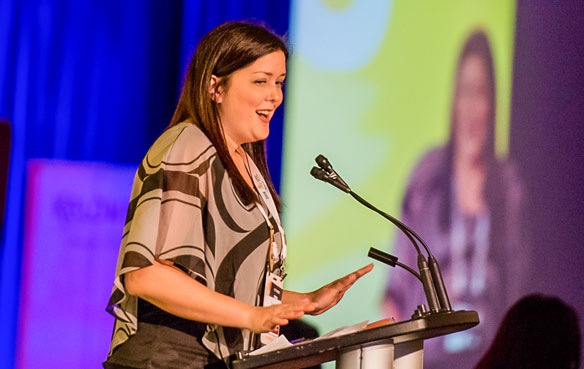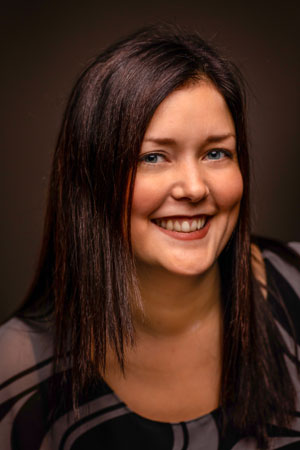
Telling Canada’s indigenous tourism story
Women in travel: Teresa Ryder

ANN RUPPENSTEIN
As the director of business development for the Indigenous Tourism Association of Canada, Teresa Ryder’s career has taken her from coast to coast to coast to witness living cultural experiences like throat singing lessons with Inuit throat singers in Iqaluit.
“Being able to go and meet people in their communities, in their space, and learn about all of our Indigenous cultures across the country, it’s so rewarding and exciting, and I get to experience things in my role that I know I’m very privileged to experience,” Ryder, who is of Musqueam descent, tells Canadian Travel Press. “It’s really rewarding to connect with people and see not only how different we are, but also what our shared experiences, our shared beliefs and our moral compasses are, and how they all overlap in some way. That’s been a highlight of my work over the last 10 years or so, to be able to connect with different cultures and have my eyes open to the diversity that is out there.”
Although she’d worked in tourism and hospitality throughout high school and her undergrad, Ryder was on a path to becoming a lawyer or getting into policing after studying criminology when she found herself doubting her next steps.
“I took a break and during that time, was offered a part time job doing some intern-style work with Indigenous Tourism BC (at the time Aboriginal Tourism Association of BC) and from there was able to apply in more of a professional role what I had learned in hospitality,” she recalls. “Then after the summer had passed, and I’d kind of given myself that time to figure things out, a full-time position came up for the fall, and here I am, I’ve stayed in Indigenous tourism. There’s still social application of my criminology degree, but it also is a good alignment of coming from hospitality and then also being an Indigenous person, it was kind of like all my worlds had come together into this job where I am now.”
Working for a non-profit organization that is committed to growing and promoting a sustainable, culturally rich Indigenous tourism industry in Canada, her role is focused around exploring development opportunities for both individual operators as well as provincial or territorial associations, and the benefits of Indigenous tourism. One of the key initiatives is the Product Development Fund, which provides direct support for business operators through a micro grant.

Ryder
“We’re able to work one-on-one with the operators to support them and some of the feedback that we’ve received that’s really resonated with me and really gets me excited about this program every year is just a small amount of money allows operators to step outside of their business, rather than just being in it all the time,” she says. “For a lot of our operators, they might be a single person operating and they’re the cook, the cleaner and the guide. So to be able to have a little bit of support to invest in their business, it’s really rewarding and it’s also immediate gratification to be able to provide support in that way for a business but then further to that, to be able to see these businesses grow and flourish and within a couple of years maybe of their first application to be able to be fully operational and accepting visitors internationally, of course, current situation aside. It’s the growth that we’ve been able to see and those relationships that get formed from being that point person and being in constant contact with the operators, it’s really rewarding work.”
Due to the havoc COVID-19 is having on the travel industry, this year the principles of the program shifted a bit.
“As you are coming into the end of the low season, it’s not like there’s an abundance of cash in the bank that’s going to pay the bills,” she says. “We recognize in order to continue to work with these businesses in the future, that we need to give them a leg to stand on to get through this summer, so the program still exists, but it’s been expanded a little bit and we’re seeing tremendous uptake from the operators with the goal of getting through this season as a rescue mission if you will, and then next season looking to recovering and being the support network for those businesses for 2021.”
Some of the biggest challenges in her role include the fact that there’s never enough money to work with and figuring out how to carve out a space for Indigenous tourism as its own unique industry and with its own set of needs within the travel sphere.
“We face so much in the media, not so much media but on the comments of the stories, challenges just in perceptions of Indigenous people. Indigenous tourism is really a space where everybody is so proud to share their stories, so it’s challenging when we have to convince people that we need our own space and we can tell our own stories and we’re doing it with pride and it’s really sensitive because they are stories that are really close to people and they’re sharing who they are as individuals,” she says. “I would say some of the biggest challenges I’ve faced are when you’re reading the negative comments about Indigenous people, Indigenous operators, it just doesn’t feel good, but knowing that at the other side of it we’re able to come out with partners and really celebrate Indigenous cultures across Canada, that’s what helps get through those bigger barriers.”
Earlier this year, Ryder was appointed to the Board of Directors for the Tourism Industry Association of Canada (TIAC). Describing the opportunity as the first time there’s been an Indigenous voice at the table, she hopes to continue to share some of the unique challenges that Indigenous people face.
“I see that as a great platform to educate our wider industry about some of those barriers but also make sure that our Indigenous tourism operators are able to participate in the wider tourism base, finding their place within the tourism industry so it’s kind of like sitting on both sides, but being able to support both mandates at that table,” she says.
For suppliers and travel agents, she says the ITAC website, https://indigenoustourism.ca/, has a listing of Indigenous tourism businesses for those who are selling Canada or a province or territory to explore the various tourism experiences that are available.
“I would encourage anybody who is selling Canada to think about the fact that you can’t really sell Canada without telling an Indigenous story so there’s a wide offering of tourism experiences and for all types of traveller,” she says. “We have Indigenous restaurants, Indigenous hotels, wineries, golf courses, we also have outdoor adventures, really remote exclusive locations, as well as really great indigenous tourism experiences in the major cities so I would just encourage everybody to go and explore what we have to offer and encourage their visitors to add an indigenous experience to their itinerary.”
As for what she’s most looking forward to doing when social distancing ends, it’s to get out and experience the outdoor spaces around Vancouver, where she lives.
“In addition to that, I recognized how social this industry is, and social isolation is difficult for all of us, so I’m looking forward to being able to reconnect with our industry, with partners, just in person, I think we’ve taken it for granted for so long, that we can just hop on a plane and go, so looking forward to reconnecting in person,” she says.
